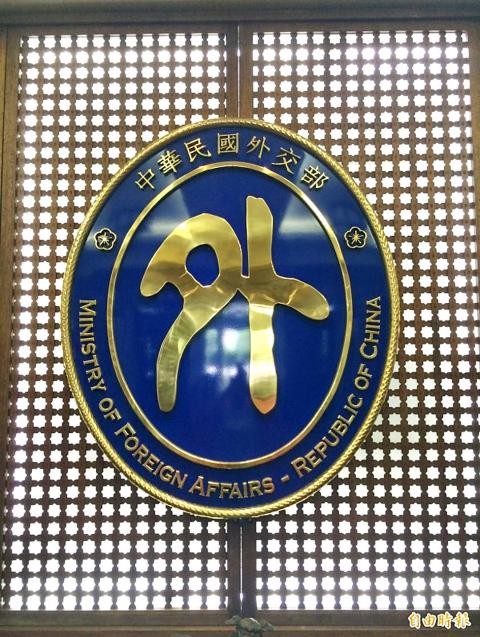The Ministry of Foreign Affairs yesterday expressed regret over the Philippines’ decision to deport seven Taiwanese fraud suspects to China, the second such move in less than a year.
“With regard to the Philippine government’s forced deportation of seven Taiwanese nationals suspected of telecom fraud today [Tuesday], we express deep concerns and regret over the matter,” deputy spokeswoman Joanne Ou (歐江安) told a routine news conference in Taipei.
The ministry had been negotiating with Manila since 13 Taiwanese were arrested in October last year in the northern Philippines in connection with fraud allegations, asking it to handle Taiwanese cases in accordance with the nationality principle and the suspects’ preferences, and to deport them to Taiwan for further investigation.

Photo: Lu Yi-hsuan, Taipei Times
Despite the best efforts of the Taipei Economic and Cultural Office in the Philippines, Manila chose to deport seven of the 13 to China in disregard of international customs and principles, as well as the suspects’ rights, Ou said.
The Philippines in April last year deported 78 Taiwanese telecom fraud suspects to China who had been among more than 150 foreigners arrested in January in Metro Manila and Ilocos Sur province by the Philippine cybercrime police.
While urging Taiwanese not to engage in illegal activities when abroad, Ou also called on Manila to strengthen bilateral anti-crime cooperation with Taipei to combat transnational crimes.
Under a memorandum of understanding on combating transnational crimes signed by the two countries in March 2017, the Philippines has extradited several Taiwanese fugitives, including former Tainan County council speaker Wu Chien-pao (吳健保) and Israeli-American Oren Shlomo Mayer.
The Manila Economic and Cultural Office in Taipei yesterday said that its government “deemed it necessary to send the suspects to Beijing for trial” as most of the victims and evidence were in China.
Manila would continue to adhere to the international community’s efforts to stop transborder crime by ensuring that perpetrators are effectively prosecuted and that punishment is meted out, it said.
The remaining six Taiwanese are in custody in Manila, where they are to face trial, because they have committed other crimes in Manila, it added.
Several nations have chosen to abide by Beijing’s “one China” principle and deported more than 400 Taiwanese fraud suspects to China since April 2016, including Kenya, Armenia, Malaysia, Indonesia, Cambodia and Vietnam.

US President Donald Trump yesterday announced sweeping "reciprocal tariffs" on US trading partners, including a 32 percent tax on goods from Taiwan that is set to take effect on Wednesday. At a Rose Garden event, Trump declared a 10 percent baseline tax on imports from all countries, with the White House saying it would take effect on Saturday. Countries with larger trade surpluses with the US would face higher duties beginning on Wednesday, including Taiwan (32 percent), China (34 percent), Japan (24 percent), South Korea (25 percent), Vietnam (46 percent) and Thailand (36 percent). Canada and Mexico, the two largest US trading

AIR SUPPORT: The Ministry of National Defense thanked the US for the delivery, adding that it was an indicator of the White House’s commitment to the Taiwan Relations Act Deputy Minister of National Defense Po Horng-huei (柏鴻輝) and Representative to the US Alexander Yui on Friday attended a delivery ceremony for the first of Taiwan’s long-awaited 66 F-16C/D Block 70 jets at a Lockheed Martin Corp factory in Greenville, South Carolina. “We are so proud to be the global home of the F-16 and to support Taiwan’s air defense capabilities,” US Representative William Timmons wrote on X, alongside a photograph of Taiwanese and US officials at the event. The F-16C/D Block 70 jets Taiwan ordered have the same capabilities as aircraft that had been upgraded to F-16Vs. The batch of Lockheed Martin

GRIDLOCK: The National Fire Agency’s Special Search and Rescue team is on standby to travel to the countries to help out with the rescue effort A powerful earthquake rocked Myanmar and neighboring Thailand yesterday, killing at least three people in Bangkok and burying dozens when a high-rise building under construction collapsed. Footage shared on social media from Myanmar’s second-largest city showed widespread destruction, raising fears that many were trapped under the rubble or killed. The magnitude 7.7 earthquake, with an epicenter near Mandalay in Myanmar, struck at midday and was followed by a strong magnitude 6.4 aftershock. The extent of death, injury and destruction — especially in Myanmar, which is embroiled in a civil war and where information is tightly controlled at the best of times —

China's military today said it began joint army, navy and rocket force exercises around Taiwan to "serve as a stern warning and powerful deterrent against Taiwanese independence," calling President William Lai (賴清德) a "parasite." The exercises come after Lai called Beijing a "foreign hostile force" last month. More than 10 Chinese military ships approached close to Taiwan's 24 nautical mile (44.4km) contiguous zone this morning and Taiwan sent its own warships to respond, two senior Taiwanese officials said. Taiwan has not yet detected any live fire by the Chinese military so far, one of the officials said. The drills took place after US Secretary